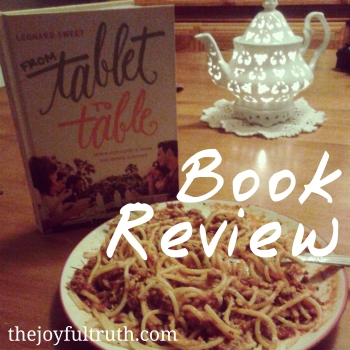This is a book that will make you evaluate your life, and your faith, in light of something that our fast food society has hugely neglected: The Dining Table. In a day and age where connection and community has been replaced by social media in a largely isolated existence Leonard Sweet calls us back to a fundamental way of living life, living life shared in the same way Christ shared.
 I did, mostly, enjoy this book. It made me stop and think about how my own family treats time together, and how, and if, I reach out to the community around me.
I did, mostly, enjoy this book. It made me stop and think about how my own family treats time together, and how, and if, I reach out to the community around me.
His point of calling back the church to intimate community and fellowship, that this is in fact what our churches today are starved for, was poignant and relevant. Bringing us back to the tradition of family and sharing of ourselves and our stories and God’s story around the dinner table gave me new inspiration in ways to center my home on Christ.
At times I found his style of writing a bit lacking in direction, at times chasing a rabbit that, though relevant, did not tie in as neatly as it should. Sometimes the theme of tables and eating and eating and tables became, well, somewhat repetitive. Sometimes he would introduce a concept or foreign word without stopping to adequately lay its ground-work, and then rush on before the thought was full fleshed out.
Over all though, the book was good and insightful.
One of my favorite parts of this book came up unexpectedly and was a welcome surprise. On page 90 he speaks of truth, and when he speaks of it he goes back to the Greek word Aletheia. I loved this part because Aletheia is a word my mother came across while studying Greek years ago, she thought the word was beautiful and would make a beautiful name, hence, my middle name is Aletheia!
I’ve always loved my name and I’ve loved what my name says about me, so this little point in the book was a real treat!
Aletheia literally means “unhiding,” the state of “not being hidden.” The root metaphor of “truth,” then, is coming out of hiding. To live the truth is to reveal one’s presence and personage, to “unconceal” oneself.
-From Tablet to Table, Page 91
It really is important that we not only share our space with one another, not only our food, but our genuine selves, and a genuine faith. I believe that to be the center of this books message, and it is a good one.
Joy Aletheia Stevens
Disclaimer: I received this book for free to review from Tyndale House, all opinions are my own. This post contains affiliate links. For more on affiliate links and other policies go to the Privacy Policy Page.
Leave a Reply